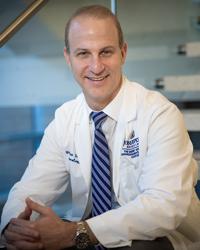Patient Story
Lung Cancer: Tina’s Story
Patient Story Highlights
- After being diagnosed with non-small cell lung cancer, Tina Dormitzer, a sales director and mother of six, sought treatment at Johns Hopkins Kimmel Cancer Center.
- Her doctor worked with her to come up with a treatment plan that included a combination of chemotherapy and immunotherapy that was specific to her needs.
- Tina was able to continue working throughout treatment and is now in remission.

Overcoming Lung Cancer
Having acute asthma, Tina Dormitzer didn’t think the shortness of breath and wheezing she was experiencing was anything more serious than maybe a repeat bout with pneumonia. But her visit to an Emergency Department on Christmas day 2017 led to assorted tests that revealed non-small cell lung cancer. With her strong organizational and self-advocacy skills, and a helpful tip from an insurance company nurse, Dormitzer made her way to the Johns Hopkins Kimmel Cancer Center at Sibley Memorial Hospital in Washington, D.C., and says she has felt great since finishing treatment in April 2019.
Dormitzer, age 50, says that things were a little confusing during her initial diagnosis period. During a 10-day stay at another hospital, she underwent several diagnostic tests and interacted with multiple pulmonologists and attending physicians, each of whom seemed to suggest a different course of action.
A pathology report revealed her diagnosis as non-small cell lung cancer, adenocarcinoma, at stage 3A, meaning the disease had spread to her lymph nodes but not to other sites of the body. When Dormitzer called her insurance company to go over coverage for chemotherapy, the company appointed her an oncology nurse navigator. The navigator recommended she look into oncology centers of excellence since she lived in the Washington metro area.
Dormitzer, a director of sales operations and mother of six, then started searching online, and was interested to see the Johns Hopkins Kimmel Cancer Center at Sibley, not too far from her office in Bethesda, Md. She found videos of lung cancer oncologist Benjamin Levy, M.D., online and decided to schedule a visit. She called and then sent her records along with a long email detailing her story. Two days later, she had her first appointment with Dr. Levy.
"We had a great rapport right off the bat," Dormitzer says. "For the first time, I was understanding my disease, and Dr. Levy really explained everything to me — the type of tumor, the staging, the meaning of different lung cancer terminology, and what treatment plan he was proposing, which included a new, FDA-approved immunotherapy instead of surgery."
Dr. Levy shared her case with a multidisciplinary group of colleagues at the next week’s tumor board meeting and called her right after with a treatment plan. Within two weeks, Dormitzer was back at Sibley for the first of four chemotherapy treatments, interspersed with radiation and followed by a year of biweekly immunotherapy treatments.
On Dormitzer’s way to a radiation appointment early in her treatment, Dr. Levy saw her in the hospital parking lot and came over to inquire about how therapy was going and how he was going to see her at the next appointment a few days later. “That moment stood out to me and was so profound,” she says. “I didn’t feel like a number or a file on the desk that was going to be looked at five minutes before a visit. He knew about my case and what was going on days before my next appointment. That solidified for me that I had made the right decision in choosing him. He truly knew his patients, and that was exactly the type of doctor that I needed.”
Dormitzer says she has high praise for Dr. Levy and the oncology team, and credits him for saving her life. They bonded over college sports, and joked about her ‘chemo brain’ and juggling life with six children. “He knew how to handle my type A, controlling personality,” she says. “I liked his confidence, and he showed me professionalism, respect and compassion.” The whole team always greeted her by name and made her feel as comfortable as possible during appointments.
Dormitzer also took advantage of additional resources and complementary therapies offered by Sibley, including acupuncture, meditation, yoga, support groups, mental health providers and palliative care, and educational events. “All of these resources Sibley provided outside of the standard medical treatment helped immensely with the day-to-day stress and anxiety that comes with being a cancer patient,” she says. “It was invaluable to me to have a place that provided all of these services.”
When Dormitzer completed immunotherapy, she planned a graduation ceremony, wearing a graduation cap and a lung cancer ribbon that said Immuno Grad. She brought gifts for Levy and nurse practitioner Rasheda Persinger, and about 300 cupcakes and thank you notes for the rest of the staff.

“I probably went overboard on the celebration,” she says, “but for two years I spent so much time every week with all of these wonderful people. They became my cancer treatment family and fought alongside with me. That is what I sought to find in a treatment center, and Johns Hopkins at Sibley exceeded my expectations.”
Throughout treatment, Dormitzer was able to keep working. She still returns to Sibley regularly for checkups, and has done some cancer advocacy work for LUNGevity and the White Ribbon Project. She also serves on the advisory board for Camp Kesem, which offers free summer camps for children impacted by a parent’s cancer.
"Tina's story is truly a testament for multidisciplinary care," Ben Levy says. "When she came to us, our group discussed her case and we determined she was better served by a combination of immunotherapy and chemotherapy. Now she's in remission."
Tina's Oncologist
Johns Hopkins Kimmel Cancer Center in the D.C. Region
At Sibley Memorial and Suburban Hospital you have direct access to world class, innovative and ground breaking care provided by teams of specialists in medical oncology, radiation oncology and surgical oncology, with access to advanced treatments through Johns Hopkins clinical trials.





